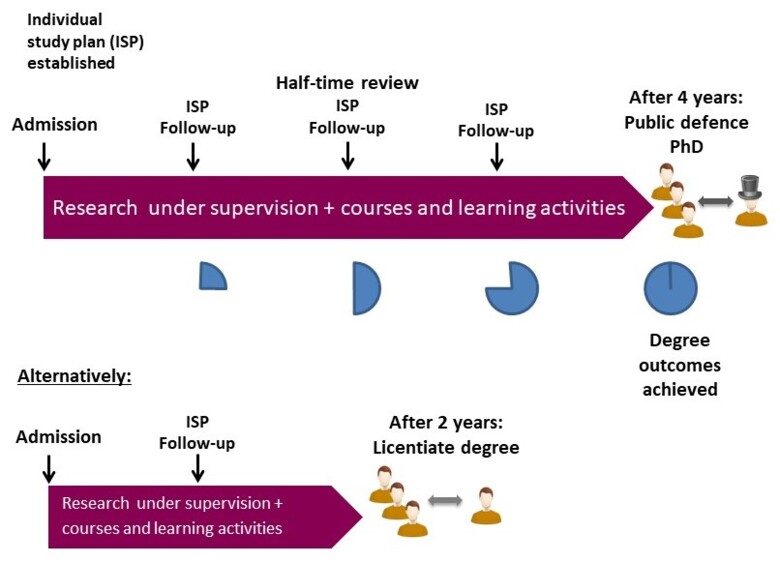About doctoral education at KI
A doctoral (PhD) degree is the highest academic degree in Sweden, and it is earned after four years of doctoral education and passing a public defence.

To complete a doctoral education means to devote oneself to a research project under supervision of an experienced researcher and to follow an individual study plan. The doctoral student will also take courses and write a thesis.
Each doctoral student has their unique doctoral education, depending on the project, the supervisors and individual qualifications but striving toward the same overall learning objectives.
In order to be eligible for doctoral education you must meet both the general and specific entry requirements.
Read more about entry requirements (eligibility) for doctoral education
Outcomes for doctoral education
After completing their doctoral education at KI, students are to have developed an advanced general knowledge of medical science and scientific methodology, and cutting edge scientific skills in whatever research field they choose to explore for their final thesis.
Please see detailed outcomes for PhD and Licentiate degrees, as defined by the Higher Education Ordinance.
Study plans
The content of the doctoral studies is outlined in the individual study plan written by the doctoral student and supervisor together and approved by the departmental director of doctoral studies after the admission. The individual study plan describes how the goals of the education will be achieved and consists of a time plan, research plan, financing plan, as well as a description of how the supervision is planned and a list of courses and other activities needed for reaching the learning outcomes. The individual study plan is followed-up and revised annually.
Course requirements and requirements for other education activities are outlined in the general syllabus for medical science.
Courses
All doctoral students are taking courses; both basic general science courses and project specific courses, as outlined in the study plan.
Research schools
KI offers a number of research schools that students can apply to either before or after admission to doctoral education. In a research school the education is more scheduled than for other doctoral students that have to apply for every single course. Most research schools are aimed for doctoral student with an employment as clinicians at a Swedish hospital. To be considered for a research school you have to apply both to the school and to an individual doctoral project at one of KI’s departments.
Doctoral programmes
When admitted to doctoral education the student chooses one or several thematic programmes that are related to their research project. The purpose with the programmes is to give a comprehensive supply of courses and other learning activities within each research area. The programmes are also a possibility for the doctoral student to create networks outside the research group and department.
Study funding
All doctoral students at KI are financially supported during the studies, either through employment at KI or through employment somewhere else. External scholarships can be used as a funding source during the first year, but only in rare exceptions through-out the entire doctoral education.
Doctoral education has no tuition fee regardless of the student’s country of origin.
Read more about study funding during doctoral education at the staff portal
Degrees
Karolinska Institutet issues following degrees at doctoral level:
- Licentiate degree (after two years studies at doctoral level)
- Doctoral (PhD) degree (after four years studies at doctoral level)
A doctoral degree is issued after a public defence of a doctoral thesis. A licentiate thesis is publically defended at a licentiate seminar.
After the degree
A doctoral degree from KI gives you cutting edge skills within your research field and opens up a wide range of career opportunities. After graduating with a licentiate or PhD degree, students can continue to pursue a scientific career at a research institute or in industry, as a researcher/teacher at a university, as a research-competent leader in the commercial or healthcare sector, as a science journalist or consultant, etc. These different professions require different skills and knowledge. Consequently, our doctoral education provides students with a broad grounding in the subject and prepares them for their scientific and professional futures beyond the scope of the study plan for an individual project.
